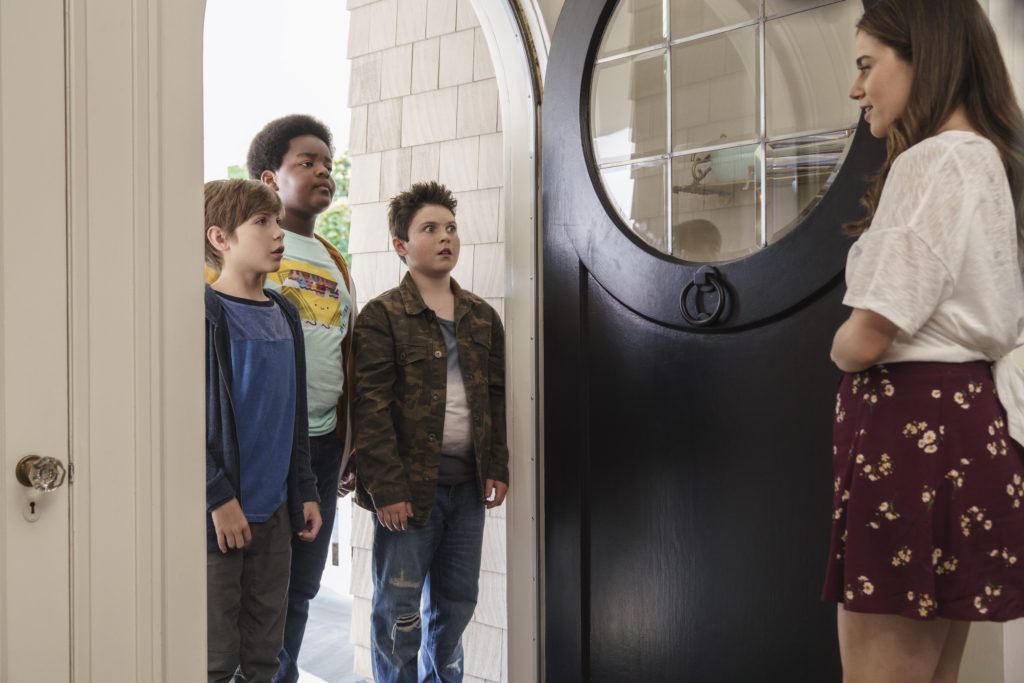Good Boys

(from left) Max (Jacob Tremblay), Lucas (Keith L. Williams), Thor (Brady Noon) and Hannah (Molly Gordon) in "Good Boys," written by Lee Eisenberg and Gene Stupnitsky and directed by Stupnitsky.
In the summer between their fifth and sixth grade year, Max, Lucas, and Thor, go where every teen comedy has gone before—except that they’re tweens. They have to make some money (by selling drugs) to replace the thing (a broken drone) before an authority figure (dad) finds out or they’ll face immeasurable consequences (grounded for a couple weeks), hindering their quest to get the girl (Brixlee, played by Millie Davis).
If there’s an inspired aspect to the film, it’s the performances of Jacob Tremblay, Keith Williams, and Brady Noon.
School buddy comedies generally rely on three stereotypes: the leader, the sidekick, and the comic relief. A trio introduces tension into the story, forcing the leader to have to choose one friend’s advice over the other’s. Often pitched as an outcast, the leader/protagonist rarely is. As Max, Tremblay looks precisely like the precocious child actor who always hits his lines on cue at the audition. He can play guileless, but you can’t convince me that, with more films under his belt than years on this Earth, popularity is an uphill climb for him. Still, his melodramatic chops work for the meta-satiric tone of a film helmed by The Office alums Gene Stupnitsky and Lee Eisenberg.
Thor (Brady Noon) embodies every sensitive kid stereotype you’ve ever met, but with a dash of nuance. Insecure about his love of theatre/singing, parents never anywhere to be found (save for artifacts from their suburban sex life; the boys’ naïveté becomes an almost tiresome joke were it not for the punchline delivered by an unusually informed little sister), we can loosely glance at someone who, in one possible future, might become a bully. He might not. The film never explores his resentment more deeply.
Williams especially shines as the unflinchingly idealistic Lucas. Convinced that honesty is the best policy, most of his appeals to authority figures backfire except when he attempts to explain to his incredulous parents—their attention divided by impending divorce—the ludicrous circumstances of the boys’ unintentional adventures in narcotics trafficking. It reminds me of the time I got a ticket for reckless driving at fifteen. I thought the world ended. My always level-headed brother sat me down and said, restraining his laughter, “It’s not that we didn’t do stupid shit when we were younger. We just didn’t get caught.”
Years later, I come to find that my nerdy engineering brother was actually the most popular kid in school. Whichever party he was at was the one to go to. Yet again, my mind blown. Like Lucas, I had no idea you could just do things and get away with them.
Molly Gordon and Midori Francis pepper the film with their young women’s take on upper classmanship. They also provide the film’s action—watch for the TERMINATOR 2 reference—and some of the conflict, particularly in an almost heartbreaking moment in which they foretell a middle school future defined by drifting tastes, alliances, romances, and breakups.
THE BOYS introduces us to several other characters along the way, including Soren (Isaac Wang), whose approval confers status in the school.
“You’ve French kissed girls, right?” asks Soren.
“Yeah!” replies Max, in a spurious tone.
Soren: “…where?”
Max guesses, “Their mouth?”
Soren pauses, then grins and fist-bumps Max, “Yeah, dawg!”
Some moments, like this, authentically amuse, but all that shapes the characters and most of the story—and the forced humor of misunderstanding adult jargon (“I’m a social piranha.”) wears out quickly. We emerge without understanding the kids on a level more sophisticated than—as a classmate once described having children—watching little, drunk people. Attempting to be topical, one scene shows the boys enlisting the aid of an anti-bullying coalition known as S.C.A.B. But the scene turns troublesome when the red-haired team leader’s speech impediment plays for laughs.
Even more disconcerting is the way the plot’s climactic event—the kissing party—veers into a sort of uncomfortable voyeurism of childhood by us, the intended adult audience.¹ It feels as though we’re given a backstage pass into moments children hold sacred, at least for those few years when the now trivial was then viscerally painful.
When it matters most, the film goes beyond formula and slow dances its way into the Detention Hall of Unintended Consequences.
- The film is R-rated with a soundtrack that includes tunes by Foreigner and Asia, two bands whose music you aren’t likely to find on the iPhones of most 25 year olds.